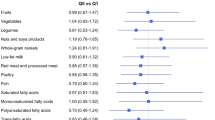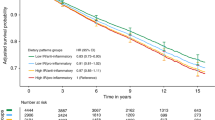Abstract
Background
The traditional Japanese diet is considered one of the important factors of health and longevity in Japanese people. Breast cancer is the most common cancer among women in the world. However, the association between the traditional Japanese diet and breast cancer is unclear. The purpose of this study was to investigate the longitudinal association between the traditional Japanese diet score (TJDS) with the incidence and mortality of breast cancer in an ecological study.
Methods
Food supply and breast cancer incidence and mortality by country were obtained from an international database. TJDS by country was calculated from nine food groups and the total score ranged from −9 to 9, with higher scores indicating greater adherence to a traditional Japanese diet. Longitudinal associations of interaction between TJDS and fiscal year on breast cancer incidence and mortality were investigated in 139 countries with populations of 1 million or greater. The longitudinal analysis was evaluated using four linear mixed-effect models with different adjustment covariables.
Results
Many countries with high scores on TJDS had lower distributions of breast cancer incidence and mortality in 1990–2017. Longitudinal analysis using a linear mixed-effect model controlled for socio-economic and lifestyle covariables showed that the interaction between TJDS and fiscal year was significantly associated with incidence of breast cancer (−0.453 ± 0.138, p < 0.01) and mortality of breast cancer (−0.455 ± 0.135, p < 0.001).
Conclusions
This longitudinal analysis suggested that a traditional Japanese diet has been associated with lower breast cancer incidence and mortality worldwide in recent years.
This is a preview of subscription content, access via your institution
Access options
Subscribe to this journal
Receive 12 print issues and online access
$259.00 per year
only $21.58 per issue
Buy this article
- Purchase on Springer Link
- Instant access to full article PDF
Prices may be subject to local taxes which are calculated during checkout


Similar content being viewed by others
References
Okada E, Nakamura K, Ukawa S, Wakai K, Date C, Iso H, et al. The Japanese food score and risk of all-cause, CVD and cancer mortality: the Japan Collaborative Cohort Study. Br J Nutr. 2018;120:464–71.
Abe S, Zhang S, Tomata Y, Tsuduki T, Sugawara Y, Tsuji I. Japanese diet and survival time: The Ohsaki Cohort 1994 study. Clin Nutr. 2020;39:298–303.
Ministry of Agricalture FaF, Japan. WASHOKU, Traditional Dietary Cultures. http://www.maff.go.jp/e/japan_food/washoku/1soup_3dish.html.
Suzuki N, Goto Y, Ota H, Kito K, Mano F, Joo E, et al. Characteristics of the Japanese Diet Described in Epidemiologic Publications: A Qualitative Systematic Review. J Nutr Sci Vitaminol. 2018;64:129–37.
Zhao TT, Jin F, Li JG, Xu YY, Dong HT, Liu Q, et al. Dietary isoflavones or isoflavone-rich food intake and breast cancer risk: a meta-analysis of prospective cohort studies. Clin Nutr. 2019;38:136–45.
Wei Y, Lv J, Guo Y, Bian Z, Gao M, Du H, et al. Soy intake and breast cancer risk: a prospective study of 300,000 Chinese women and a dose-response meta-analysis. Eur J Epidemiol. 2020;35:567–78.
Zheng JS, Hu XJ, Zhao YM, Yang J, Li D. Intake of fish and marine n-3 polyunsaturated fatty acids and risk of breast cancer: meta-analysis of data from 21 independent prospective cohort studies. Bmj. 2013;346:f3706.
Nindrea RD, Aryandono T, Lazuardi L, Dwiprahasto I. Protective effect of omega-3 fatty acids in fish consumption against breast cancer in Asian patients: a meta-analysis. Asian Pac J Cancer Prev. 2019;20:327–32.
Aune D, Chan DS, Vieira AR, Rosenblatt DA, Vieira R, Greenwood DC, et al. Fruits, vegetables and breast cancer risk: a systematic review and meta-analysis of prospective studies. Breast Cancer Res Treat. 2012;134:479–93.
Shin S, Saito E, Inoue M, Sawada N, Ishihara J, Takachi R, et al. Dietary pattern and breast cancer risk in Japanese women: the Japan Public Health Center-based Prospective Study (JPHC Study). Br J Nutr. 2016;115:1769–79.
Hirose K, Matsuo K, Iwata H, Tajima K. Dietary patterns and the risk of breast cancer in Japanese women. Cancer Sci. 2007;98:1431–8.
Bray F, Ferlay J, Soerjomataram I, Siegel RL, Torre LA, Jemal A. Global cancer statistics 2018: GLOBOCAN estimates of incidence and mortality worldwide for 36 cancers in 185 countries. CA Cancer J Clin. 2018;68:394–424.
Imai T, Miyamoto K, Sezaki A, Kawase F, Shirai Y, Abe C, et al. Traditional Japanese Diet Score—Association with Obesity, Incidence of Ischemic Heart Disease, and Healthy Life Expectancy in a Global Comparative Study. J Nutr Health Aging. 2019;23:717–24.
Trichopoulou A, Costacou T, Bamia C, Trichopoulos D. Adherence to a Mediterranean diet and survival in a Greek population. N. Engl J Med. 2003;348:2599–608.
Guidelines for the compilation of Food Balance Sheets, 2017. Accessed 7 Oct 2019. http://gsars.org/wp-content/uploads/2017/10/GS-FBS-Guidelines-ENG-completo-03.pdf.
Database FSD. http://www.fao.org/faostat/.
Global Burden of Disease Study 2017 (GBD 2017) Data Resources. Accessed 7 Oct 2019. http://ghdx.healthdata.org/gbd-2017.
Global, regional, and national incidence. prevalence, and years lived with disability for 354 diseases and injuries for 195 countries and territories, 1990–2017: a systematic analysis for the Global Burden of Disease Study 2017. Lancet 2018;392:1789–858.
The World Bank database. https://data.worldbank.org/.
McGilchrist CA. REML estimation for survival models with frailty. Biometrics 1993;49:221–5.
R: A language and environment for statistical computing. R Foundation for Statistical Computing, Vienna, Austria. 2019. Accessed 7 Oct 2019. https://www.R-project.org.
‘nlme’. P. https://cran.r-project.org/web/packages/nlme/nlme.pdf.
Tsu City College Repository. https://mietan.repo.nii.ac.jp/.
Dandamudi A, Tommie J, Nommsen-Rivers L, Couch S. Dietary patterns and breast cancer risk: a systematic review. Anticancer Res. 2018;38:3209–22.
Wu J, Zeng R, Huang J, Li X, Zhang J, Ho JC, et al. Dietary protein sources and incidence of breast cancer: a dose-response meta-analysis of prospective studies. Nutrients. 2016;8:730.
World Cancer Research Fund AIfCR. Breast Cancer, How diet, nutrition and physical activity affect breast cancer risk. https://www.wcrf.org/dietandcancer/breast-cancer.
Deapen D, Liu L, Perkins C, Bernstein L, Ross RK. Rapidly rising breast cancer incidence rates among Asian-American women. Int J Cancer. 2002;99:747–50.
Uifalean A, Schneider S, Ionescu C, Lalk M, Iuga CA. Soy isoflavones and breast cancer cell lines: molecular mechanisms and future perspectives. Molecules. 2015;21:E13.
Schley PD, Jijon HB, Robinson LE, Field CJ. Mechanisms of omega-3 fatty acid-induced growth inhibition in MDA-MB-231 human breast cancer cells. Breast Cancer Res Treat. 2005;92:187–95.
Reuben SC, Gopalan A, Petit DM, Bishayee A. Modulation of angiogenesis by dietary phytoconstituents in the prevention and intervention of breast cancer. Mol Nutr Food Res. 2012;56:14–29.
Ministry of Agricalture FaF, Japan. Traditional Dietary Cultures of the Japanese. https://www.maff.go.jp/e/policies/market/attach/pdf/index-12.pdf.
Troisi R, Altantsetseg D, Davaasambuu G, Rich-Edwards J, Davaalkham D, Tretli S, et al. Breast cancer incidence in Mongolia. Cancer Causes Control. 2012;23:1047–53.
Demchig D, Mello-Thoms C, Brennan PC. Breast cancer in Mongolia: an increasingly important health policy issue. Breast Cancer. 2017;9:29–38.
Nagata C, Mizoue T, Tanaka K, Tsuji I, Tamakoshi A, Matsuo K, et al. Soy intake and breast cancer risk: an evaluation based on a systematic review of epidemiologic evidence among the Japanese population. Jpn J Clin Oncol. 2014;44:282–95.
A Dictionary of Epidemiology. 6th edition ed: Oxford University Press; 2014. Ecological Bias. https://www.oxfordreference.com/view/10.1093/acref/9780199976720.001.0001/acref-9780199976720.
Acknowledgements
We would like to thank Forte Science Communications (Tokyo, Japan) for carefully English proofreading the manuscript.
Author information
Authors and Affiliations
Contributions
All authors contributed to the study conception and design. Data collection and analysis were performed by CA, TI, and HS. The first draft of the manuscript was written by CA and all authors commented on previous versions of the manuscript. All authors read and approved the final manuscript.
Corresponding author
Ethics declarations
Conflict of interest
The authors declare that they have no conflict of interest.
Additional information
Publisher’s note Springer Nature remains neutral with regard to jurisdictional claims in published maps and institutional affiliations.
Supplementary information
Rights and permissions
About this article
Cite this article
Abe, C., Imai, T., Sezaki, A. et al. A longitudinal association between the traditional Japanese diet score and incidence and mortality of breast cancer—an ecological study. Eur J Clin Nutr 75, 929–936 (2021). https://doi.org/10.1038/s41430-020-00847-5
Received:
Revised:
Accepted:
Published:
Issue Date:
DOI: https://doi.org/10.1038/s41430-020-00847-5
This article is cited by
-
Traditional japanese diet score and the sustainable development goals by a global comparative ecological study
Nutrition Journal (2024)
-
Therapeutic effect of some natural active compounds for breast cancer
Medical Oncology (2022)
-
What constitutes healthiness of Washoku or Japanese diet?
European Journal of Clinical Nutrition (2021)



